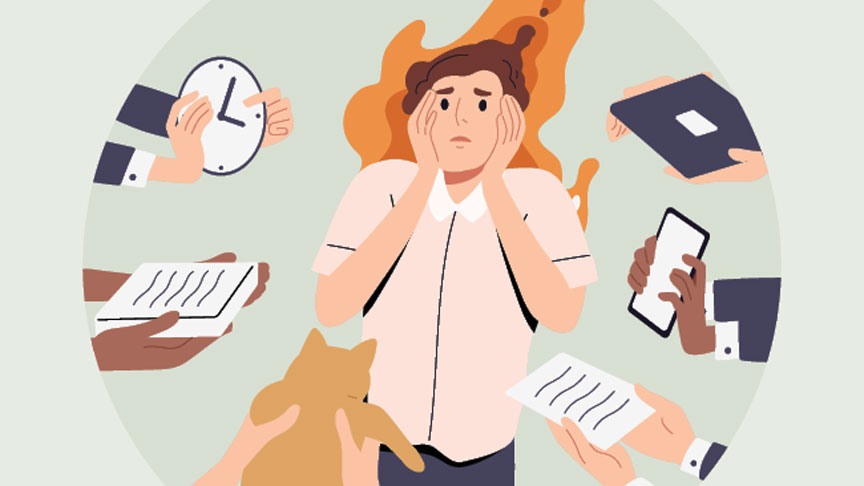Burnout in a Grind Culture
by Kianna Ancheta | Thursday, Mar 23, 2023
How did we manage to turn working non-stop into an aesthetic? We live in a culture that praises people who work extremely hard. It’s becoming too easy to call young adults “lazy” or “lost” if their work habits aren’t up-to-par. No one wants to seem lazy or be recognized as doing bare minimum, right? Who would?
There’s an entire group of social media influencers who’ve mastered romanticizing “the grind.” I see medical students posting themselves studying, gym rats posting their workout videos and transformations, entrepreneurs posting their get-rich-quick hacks, etc. I fell into that identification of being a social media influencer; I live in the perfect environment to have a successful page revolving around the life of an Honors College student. I was good at making my life look pretty while my daily schedule was packed from 7 am to midnight. My day-to-day content showed me as a full-time student with a full-time job, I was working part-time for a beauty company through social media, I was running my small photography business, working out 5 days a week, keeping up with my chores, and making sure I made time for friends. I was living it up, I was happy and always on the go.
What people didn’t see online was that I was getting four hours of sleep at night, I was emotionally drained, and I was incapable of giving more than the bare-minimum effort throughout the day because I was so anxious about what was next on my to-do list. I let this go on for a full calendar year, but I didn’t care because I was being called “a trooper” every day, and praised for how much I could accomplish. That was my reward. It felt amazing to be seen as a hard worker and to know that I could do something not everyone else could–work non-stop–but at what cost?
I ran myself into the ground and hit what’s called burnout. I was exhausted, drowning in work, and had no time for myself. I had lost all motivation and lost who I was. My burnout began with imposter syndrome, an overwhelming sensation that I was a fraud. I fell into the routine of posting on the internet like I was working extremely hard, but my days weren’t as productive as I was making it out to be. I didn’t know how to be okay with the fact that some weeks are just busier than others. I didn’t know how to be okay with not finishing my to-do list before going to bed. I didn’t know that constant racing thoughts, constant worry, constant fatigue, and constant guilt weren’t normal. I made this my reality without knowing.
I think it’s fair to say that when I hit burnout, my plate was full, and it had been for a while. I took pride in being able to balance a full plate, but before I knew it… I couldn’t get out of bed until I absolutely had to. I fell behind in schoolwork for a month. I was emailing my professors for extensions, fully knowing that I had plenty of time to get my school done, but I couldn’t bring myself to be productive without my “panic monster.” I stopped working out and was physically weak because I started skipping meals to get work done. I had no energy to maintain my hygiene or a clean space. My grades started to slip. I was crying every day and having weekly panic attacks. I didn’t want to do anything. I broke.
I started going to therapy with the intention of simply learning how to balance my plate and get back on the horse, but I learned how to unpack and found the real root of my problem, which was that I was overworking myself. I wanted to stand out in my environment, and I thought that receiving praise for working hard was how I would do that. It took burnout to realize the life that I have already begun building for myself and that I didn’t need to keep striving as hard as I was.
The Honors College has a strong grind culture and I see it not only within my close friend group but with most students on campus. A heavy portion of the student body is on some track to med school, with the MCAT grind being a beast of its own. I’ve never been surrounded by so much ambition, intelligence, and diversity within such a small community… and yet most of us still struggle to find a healthy balance of work. I wish I knew how to avoid burnout before it happened. Recovering from burnout took nearly half a year. I want to share with you what I did to recover from burnout and the steps I now take to prevent it from happening again.
Talk to a professional
- Therapy is a safe and confidential place to be transparent with what’s going on in your life, both good and bad. In therapy, I learned:
- More about common mental illnesses and phenomena…
- Worry = cognitive rehearsal, apprehensive expectation
- Depressive signs and symptoms = sleep disturbance, decreased energy, excessive guilt, appetite disturbance, etc.
- Imposter syndrome = excessive doubt about skills, accomplishment, and belonging
- Breathing exercises for when I feel anxious
- Journaling exercises to reflect on my days
Time management
- One of my favorite tools to use is Google Calendar. This helps me to keep my classes, study times, work schedules, mealtimes, and personal events organized.
- Color coding–this is a great way to stay organized and still make sure you’re taking enough time for yourself. You can assign various events in different colors to visually navigate your schedule easier.
- Example: School = yellow, pink, green. Work = blue. Personal = brown.
Take time for yourself.
Ask yourself: are you working to live or living to work? Taking time to yourself is so important but so underrated. I started by blocking an hour out of my day to do what I want, whether it’s looking at TikTok, performing a self-care routine, finding new hobbies, going to the beach. Whatever. This is your time.
Relevant Thrive Blog Posts…
-
If You Give a College Kid A Cookie: Advice For First Time College Students: https://www.fau.edu/thrive/students/thrive-thursdays/advicetofreshman/index.php
-
Steps To Self-Care Success: https://www.fau.edu/thrive/students/thrive-thursdays/selfcare/index.php


